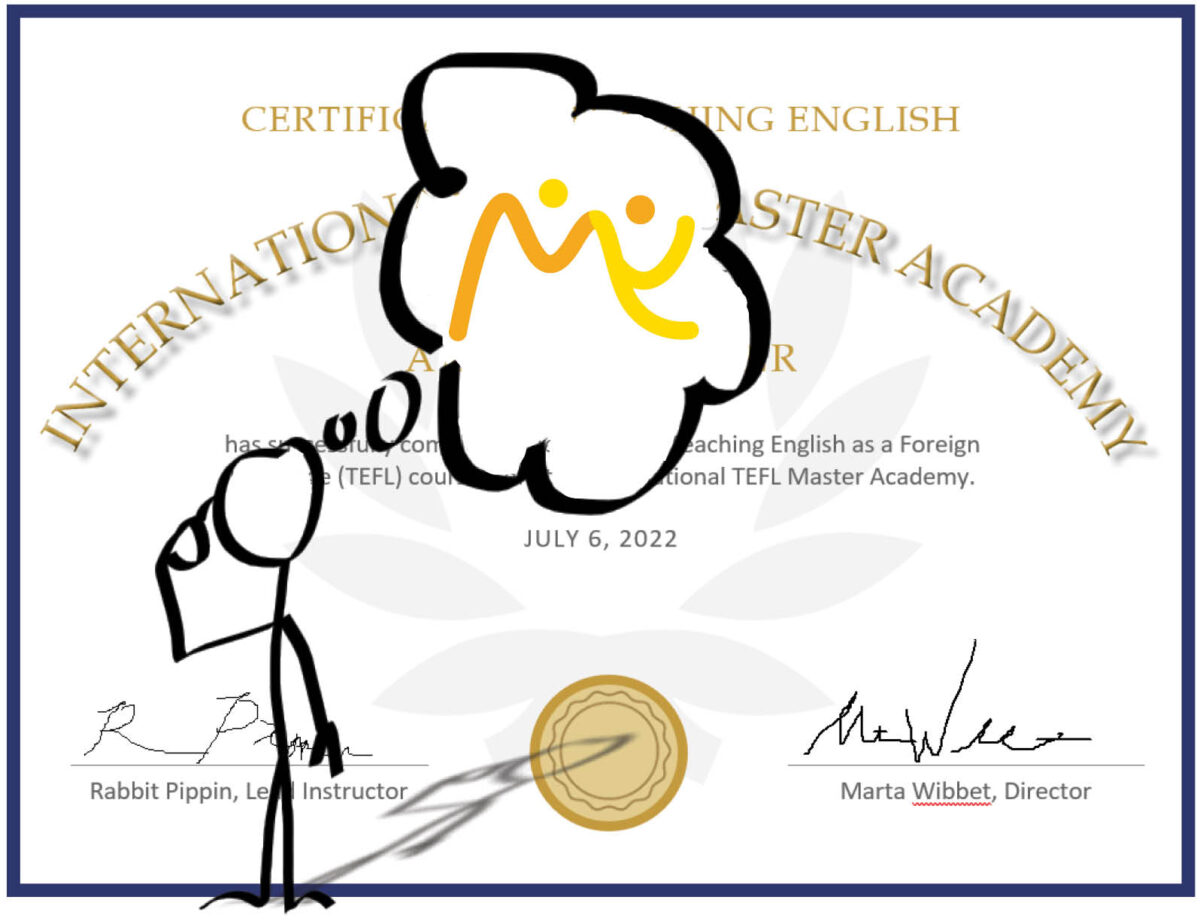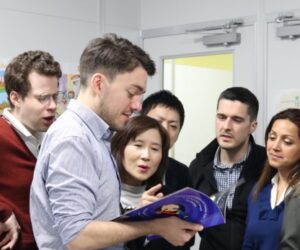The last time MY English School seriously considered the TEFL certificate question was over ten years ago, before I started teaching at MY. Some things have changed in the TEFL industry in the past decade, and some haven’t. At the time, over a decade ago, MY decided to accept and recommend to teachers primarily one course: OnTESOL’s 250-hour diploma.
Why this course? If MY was going to set a TEFL requirement for teachers, we wanted it to be a meaningful, rigorous certificate. OnTESOL’s 250-hour diploma is accredited by TESL Canada, whose accreditation is recognized by the Canadian government to qualify teachers to teach in Canadian schools. We judged that a certificate endorsed by a government-recognized agency to qualify a person to teach in the country’s schools was good enough for MY. OnTESOL provides the course online in a format accessible to MY teachers, so this has been the course we recommended to teachers upon joining MY for the past decade.
No TEFL certificate is perfect. We compensate for shortcomings during MY’s teacher training, and the foundation provided by the TEFL certificate is valuable.
The OnTESOL diploma is not perfect. No TEFL certificate is. OnTESOL, like many certificates, focuses solely on educating adults. In my current teaching schedule, about 70 percent of my students are kindergarten or elementary-age. Most of the remaining 30 percent are junior high and high school students. This makeup of students is typical for many teachers at MY. OnTESOL also recommends many teacher-centered techniques, including the much-maligned PPP, that do not fit with MY’s student-centered style. Still, we compensate for shortcomings during MY’s teacher training, and the foundation provided by the diploma is valuable.
Although we have recommended OnTESOL to new teachers lacking certificates, many prospective and incoming teachers at MY already possessed TEFL certification. We reviewed these certificates case-by-case. More than a few certificates, we declined to accept. Some certificates, like the CELTA, we readily accepted. Any higher qualification, like the DELTA or a related university degree, has also always been accepted.
Why reconsider? A 2018 change by TESL Canada forced MY to search for additional TEFL options. Previously, anyone could register for the OnTESOL diploma, but TESL Canada’s revised standards require that everyone in the course must already possess a bachelor’s degree. For the majority of MY’s teachers, a university degree is not a problem. Since an undergraduate university degree is required to obtain a work visa to enter Japan, most of the pool from which MY hires are university graduates. However, some MY teachers are not in Japan on work visas, and they may or may not have university degrees. For a teacher without a bachelor’s degree, MY needed a new path for certification.
Why require teachers to be TEFL certified?
In many, if not most, professional fields, certification is a gatekeeping tool. The certification requirement keeps riffraff out and ensures only serious professionals. This keeps the labor pool smaller and wages higher for workers. It also makes the hiring process simpler for employers.
Some language schools and teaching programs set TEFL certificate requirements to simplify their hiring processes. Not MY. We frequently hire teachers who are not yet certified. Instead, we require teachers to become certified during their first year at MY. (MY also offers a substantial raise as incentive for becoming certified.)
Some language schools and teaching programs set TEFL certificate requirements to simplify their hiring processes. Not MY. We frequently hire teachers who are not yet certified.
At MY, we acknowledge that certification does not guarantee a person is a good teacher. A certificate only shows that the person has completed a certificate. Still, MY requires teachers to be TEFL-certified for two main reasons:
- Marketing. We market to our students that MY’s teachers are professionals. MY does not hire people merely because they are native English speakers. We hire people because they are professional teachers. We observe a teacher’s quality and potential in a MY classroom before hiring the person, but a TEFL certificate is a formal mark of professionalism. It is part of our guarantee of quality to students.
- Professionalism. Being a professional is not merely about holding a piece of paper. It is about being connected in a community of people who share our profession. We want MY’s teachers to participate in professional communities inside and outside MY. Understanding the basic language and concepts of the profession is necessary to participating in the community of language teachers. A quality TEFL certificate can provide this professional foundation.
If MY is going to set a TEFL requirement for teachers, we want it to be a meaningful, rigorous certificate.
The TEFL challenge. As MY’s Leadership Team began to reconsider what MY regards as an approved certificate, it felt like opening Pandora’s box. Telling teachers, “You must possess a quality TEFL certificate,” is easy. Defining “quality” and weighing certificates against each other? There are hundreds and perhaps thousands of options: universities, dedicated TEFL schools, onsite, online, and hybrid, with teaching practicums and without. Programs differ in content, delivery, assignments, hours, price, and more. How to compare? How to judge?
Check back next week to look at what MY discovered while examining the TEFL certificate field in 2022, including three bright spots (and a lot of red flags to watch for) and what MY’s approach to TEFL certificates will be moving forward.
Part 1: The TEFL Problem
Part 2: Why TEFL?
Part 3: Three Bright Spots in the TEFL Industry (and a lot of red flags to watch for)
Part 4: Moving forward on MY’s TEFL certificate requirements








